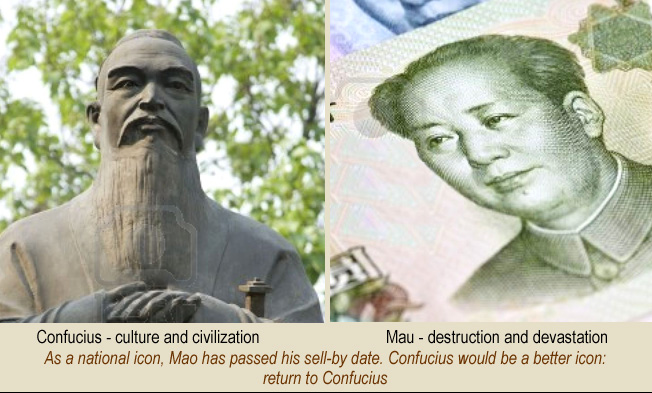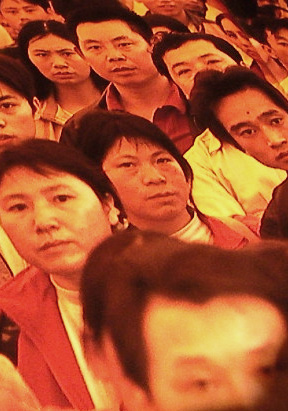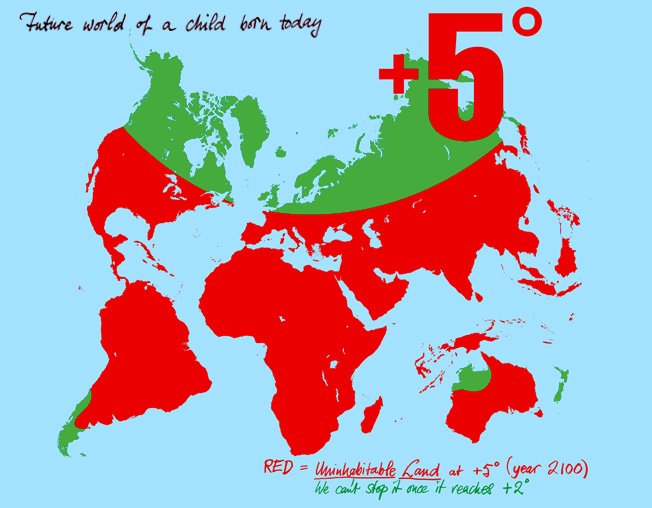Open Letter to the People of China
I have been reading Jared Diamond’s ‘Collapse’ which treats of lost worlds and vanished civilizations: these people died from habit. They flourished at first by exploiting unsustainable resources. As these resources diminished, they failed to adapt but pressed on to the end.When I came to the section on modern societies I found that China has four times the growth rate of any major country. Here, a quote from ‘Collapse’ (p358):
China’s environmental problems are among the most severe of any major country, and are getting worse. The long list ranges from air pollution, biodiversity losses, cropland losses, desertification, disappearing wetlands, grassland degradation, and increasing scale and frequency of human-induced natural disasters, to invasive species, overgrazing, river flow cessation, salinization, soil erosion, trash accumulation, and water pollution and shortages. These and other environmental problems are causing enormous economic losses, social conflicts, and health problems within China. All these considerations alone would suffice to make the impact of China’s environmental problems on just the Chinese people a subject of major concern.
But China’s large population, economy and area also guarantee that its environmental problems will not remain a domestic issue but will spill over to the rest of the world, which is increasingly affected through sharing the same planet, oceans, and atmosphere with China and which in turn affects China’s environment through globalization.
‘Collapse’ was published in 2006. The Chinese are now more advanced in plans to tackle climate change.
Instead of giving way to despair I began to write an open letter:
Dear People of China
It is now obvious that the Capitalist System perpetrated by the Western powers will crash – either before or after runaway climate change, we don’t know.
The world financial crisis is the match of the ecological crisis. We have a financial crisis because the earth is running out of natural resources and there is not so much left to exploit. As we know, once global warming reaches an increase of +2 degrees we can do nothing to stop climate change. The earth will then migrate to a temperature of +5 or +6 degrees by the end of the century.
We need to STOP climate change by changing our values, together with our financial system; banks should provide a service, not be run for profit. The only growth possible is in quality not quantity, and that means quality of life.
China is the one major power which could achieve this transition of values and provide itself with a financial soft-landing. This would help slow down climate change and preserve habitats for many creatures, including people. In the event that China could provide a model for other nations to copy, we could stop climate change and turn disaster into hope for a better world.
Our other source of hope is from thousands of individuals, charities and NGO’s who are already implementing ways to combat climate change using a hands-on, bottom-up approach (like the Cool Earth organization).
The harmful values we should change: The ideal of efficiency which dominates western nations grew out of our admiration for the changes which the Scientific Revolution brought to our world, together with the products of Scientific Industrialism. Yet this efficiency is only restless change, bringing us no nearer to desirable goals. It is merely efficiency for the sake of efficiency. We don’t know what our goals are. We have come to depend upon money. We let businessmen make the decisions in the belief that some of us will get more money – we used to believe that everyone would get more.
China is acutely aware that THE WORLD IS RUN FOR CHEAP LABOUR.
1. Industrial methods of production do not require skill and wages can be kept to a minimum; maximum exploitation works for a time but neglect of farming, destruction of land and pollution causes rises in food prices and wages. In a world of over-population, factories can be relocated.
2. Priority access to cheap raw materials is essential to this production. In addition, these raw materials provide cheap infrastructure to privileged nations, e.g. energy, transport, water.
They therefore support those populations who consume the most and pay taxes.
3. Governments support global monopolies: by war, by legislation (e.g. legal permission for mining and drilling and by the backup of international trade agreements) and, most importantly, by I.O.U. World debt depends on the promise of constant revenue from the tax-payer.
This state of affairs has been won by depletion of natural resources and destruction of our planet. ‘Business as usual’ means power to the few, massive consumption (mostly junk) by the many and suffering by the most. It is death to continue.
Why at this late stage does China want to join in global destruction? China has a social structure embedded in her history which lends itself to the practice of top-down policy. (A modern example: one child per family.) She could consolidate her gains and change strategy to preserving life on earth.
 Social cohesion was imposed, not by religion but by a code of good behaviour, introduced by Confucius who was a completely historical person (BC 551 – 479). He taught self-restraint, moderation and, above all, courtesy.
Social cohesion was imposed, not by religion but by a code of good behaviour, introduced by Confucius who was a completely historical person (BC 551 – 479). He taught self-restraint, moderation and, above all, courtesy.Government was in the hands of a meritocracy; officials were elected for their learning and moral character – then, later, they were selected by a literary examination. The examination system profoundly affected the civilization of China. It was customary for the scholar bureaucrats to be pure Confucians, sceptical in religion but not in morals and because of them the Confucian system maintained its hold – others were free to practice a mix of Confucianism, Taoism, Buddhism and magic.
Thus the Chinese character appreciates present pleasure and reward in this life – not reward in the future, after death, elsewhere. Money is a means of enjoyment, not power. Chinese people are too proud to be impolite, they are proud to be Chinese.
Then in the 20th century the Chinese mustered the necessary patriotism to fight back. They deposed the Emperor and during the Communist Revolution they once more closed their doors to the rest of the world.
Unlike patriotism, nationalism assumes a national superiority and a right to exploit everyone else. I appeal to Chinese wisdom, their moderation and restraint; the 20thcentury couldn’t have swept it all away.
– The rainforest is worth more alive than dead. Countries must act unilaterally, as Norway is doing.
– Water is our most precious commodity yet, for example, people use water to extract gas from shale and the water is worth more than the gas.
– Unregulated shipping is responsible for 50% of ice melt! Richard Branson is trying to introduce cleaner shipping. Join him.
– China could implement James Lovelock’s suggestion that farmers could extract loads of CO2 from the air and store it for other uses by converting it into char. We must use the science we have to hand, not wait for future technologies.
– Nuclear Energy: China plans to use thorium, unlike uranium this is safe and abundant and may be the best present science for clean energy. Why don’t we hear more about thorium?
– Meat is inefficient and toxic; ‘only fruit and vegetables’ is the preferred choice for energy and health.
I came to love China when I discovered Chinese painting. For me, this achievement marks the highpoint of existence. (The nearest place to London that I know where it is possible to see Chinese painting is in the Metropolitan Museum in New York.) The British Museum is good for bronzes and vases. Read: Jung Chang, ‘Wild Swans’; Bertrand Russell, ‘The Problem of China’; Cao Xueqin, ‘The Story of the Stone’.
An important thought: We know how language changes over the centuries and phonetic spelling changes with it, but in China only the spoken language has changed. Written language is stored in written characters; each character is an ideogram, a concept. A modern Chinese person can still read the ideas of two thousand years ago.
I have just learnt with dismay that your schools no longer teach calligraphy. Should this ability be lost then the Chinese will no longer be Chinese.
Investment in Education is true and lasting wealth and an example of growth in quality of life.
Economic growth is not possible in today’s world. Even you, China – if diminished resources, damage, sickness and death were truly calculated, (together with your negative assets in the form of debt) you would be making a loss – working for nothing.
I know the idea is to become global and, therefore, exploit others. But Confucius knew best, he said, “Do unto others as you would be done by.” Protection of the environment is your wisest plan. Sustainability: not economic growth.





Hi Vivienne,
I would just like to start by saying I am a huge fan, this comment does not have much relevance to this blog post, however, I wanted to write to you, and I couldn’t work out how, outside commenting on one of your posts. I very much enjoy you blog, it is fantastic, and speaks a lot of sense to me. I am an art lover, from head to toe, life is all about expression and appreciating other peoples expressions for me. However I am a musician, I am a pianist/composer. As someone who write music from inspiration from paintings, art, life, fashion, from my condition synesthesia (where when people hear music, they see colours in their head) and just from my heart, I was wondering if you would just spare a very small amount of time to listen to one of my compositions, it is only 1 minute & 50 seconds long, and it got to no. 1 in the classical charts. Musicians such as Michael Nyman praise it, I was wondering if I could maybe get an opinion from an artistic genius like yourself?
http://www.youtube.com/watch?v=N3mA6ROFjY0&feature=channel_video_title
I love your clothes, however I can’t afford them, so I have taken on board what you have said about DIY, for instance, I love your Chaos headbands, so I got a piece of blue material, cut a strip, fixed the back together, and wrote Chaos on it with a permanent marker! Sure, doesn’t look as good as the original, but the design is there I suppose! Thank you for all the wonderful fashion you have created, you are a modern day icon 🙂
Kyle.
Comment by Kyle Nash-Baker on 01/05/2011 at 11:52 pm
Dear Kyle
I am so excited by your music – thank you for sending it to me! There is a big need for a new ballet and I know a great choreographer. There are many talented people in ballet and now that I know about you, I really need to think about a story for us to work on. I’ll be back in touch as soon as I can.
Comment by Vivienne on 05/05/2011 at 1:28 pm
I think what Diamond is saying is capatalist propaganda so as to divert people’s minds from their reality, like the financial crises and the fact they’re going to have to pay bills that the banks created.
I think it’s disgusting, it’s just what many people are saying in the media, there’s no ideas from his own brain, he has just jotted down supposed facts that aren’t proved by any name and area where all this maybe happening in China and that it is probably what got him published.
Comment by Agnes on 06/05/2011 at 9:30 pm
Dear Agnes
Thank you for reading the blog and for communicating your thoughts – but what you have done is base your opinions on one paragraph we quoted from Diamond’s ‘Collapse’, first published more than 6 years ago in 2005. The quote we used is an overview of his ideas, sometimes useful before going into more detail which, in this case, is based on Diamond’s really thoroughly researched facts and years of personal experience doing fieldwork in China.
You can’t base your evaluation of Diamond’s original work on one extract; you owe it to yourself to read the book – but this takes time and concentration. By the way, we are hopeful about the situation in China and believe the Chinese people are on their way to doing something about it.
Regarding the financial situation: don’t forget that economics is not a science. It is, rather, an agreement. If people agree to live in debt, it will happen. It’s totally unrealistic to think this debt will be paid back. We think we need another system – fast – e.g. banks shouldn’t make a profit. They should be a service.
How about reading the book and then making a judgement?
Comment by Vivienne on 10/05/2011 at 1:44 pm
I bought a copy of Jared Diamond’s “Collapse” and find it fascinating reading. I am just a few chapters in, but what really stands out to me is that we as humans have not changed much through the ages in our basic behavior. We tend to protect our own “tribe” or people group at the expense of others and do not make decisions based on what would most benefit the entire population. Of course things are changing today with globalization, but I still wonder if enough people will care to save the planet from destruction and ruin. We as humans are incredibly intelligent beings, and I would hope that we could find a way to make the right choices to secure a future for our society and our habitat on this planet. I agree that we each have to make choices in our own lives, and that “what one person can do” is very important to the whole problem. Thanks, Vivienne, for recommending this book to us, and I would encourage other Manifesto readers to find a copy and give it a try!
Best Regards,
Jeffrey Jordan
Comment by Jeffrey Jordan on 10/05/2011 at 2:08 pm
Dear Vivienne
Thank you for your inspiration and continued awareness-raising that is founded in both knowledge and passion. I concur with the views that you express on both the urgency of climate change and the interweaved system of capitalist growth. Until relatively recently I found myself completely paralysed by fear in regards to these matters; fear of appearing stupid or morbid by my warnings of imminent environmental collapse; fear of the pain i would experience if i let myself open up to the reality of the situation; the fear of my guilt in contributing to the situation and more specifically fearing absolute powerlessness. I have realised now that I cant possibly be the only one experiencing at least one of these states!… and so i am in the process of trying to free myself and use my skills and knowledge as a psychologist to somehow open these realisations to others, so we can together all challenge the establishment and stop the “business as usual” with mass awakening.
Thank you for bringing your influence.
Kind wishes
Alex
Comment by alex toombes on 21/05/2011 at 8:05 pm
Hi Vivienne,
That was very very interesting.
Thank you
Cobalt
Comment by Cobalt on 22/09/2011 at 6:17 pm